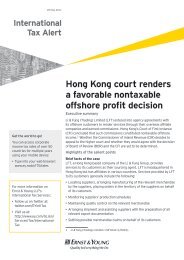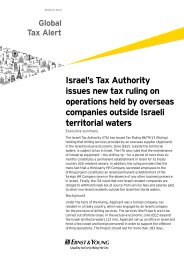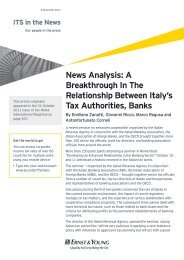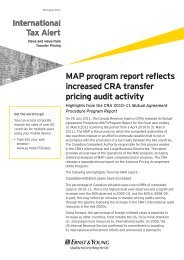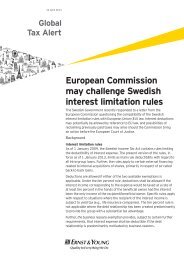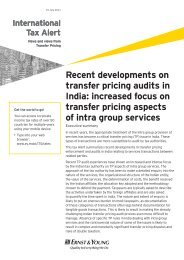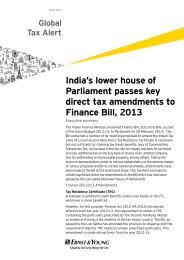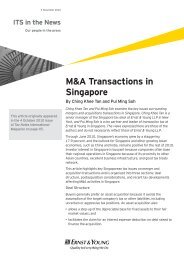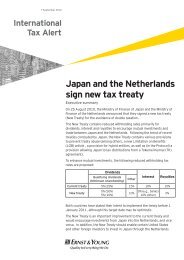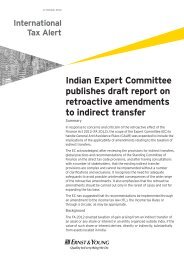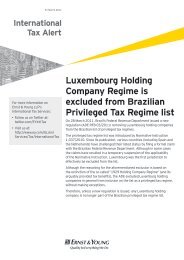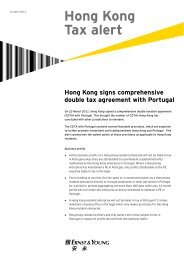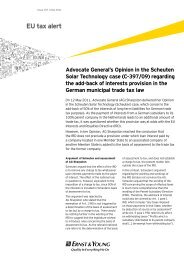Download - Ernst & Young T Magazine
Download - Ernst & Young T Magazine
Download - Ernst & Young T Magazine
Create successful ePaper yourself
Turn your PDF publications into a flip-book with our unique Google optimized e-Paper software.
Biography<br />
A clinical professor of<br />
leadership and<br />
organizational change,<br />
Manfred Kets de Vries<br />
holds the Raoul de Vitry<br />
d’Avaucourt Chair of<br />
Leadership Development<br />
at INSEAD, France,<br />
Singapore and Abu<br />
Dhabi. He is the Founder<br />
of INSEAD’s Global<br />
Leadership Centre and<br />
the program director of<br />
INSEAD’s top<br />
management seminar:<br />
“The Challenge of<br />
Leadership: Creating<br />
Reflective Leaders.” His<br />
most recent book is The<br />
Hedgehog Effect: The<br />
Secrets of Building High<br />
Performance Teams<br />
(John Wiley & Sons,<br />
2012).<br />
Developing global leaders<br />
There are few greater challenges than leading a<br />
large organization in today’s fast changing and<br />
competitive world. Leaders face a baffling<br />
array of questions: How do you create highperformance<br />
organizations? How can you design<br />
effective teams? How do you hold virtual and<br />
cross-cultural teams together, working for a common<br />
purpose, in complex, matrix-like structures?<br />
As the pace of economic globalization continues,<br />
senior leadership teams are becoming increasingly<br />
diverse. And with the growing importance of the<br />
developing world, this trend is only going to continue.<br />
Although most large corporations try and create all<br />
encompassing homogenous global corporate<br />
cultures — that only goes so far. To succeed, CEOs<br />
and senior leaders need more than ever to<br />
understand the international dimension of leadership<br />
– to learn how to work with a diverse group of leaders<br />
from different countries and cultures. Present-day<br />
leaders need to be savvy in building networks in<br />
these organizations through co-creation. They need<br />
to know how to tap the brains of an increasingly<br />
diverse workforce.<br />
Managing a diverse team is challenging<br />
because people tend to like the familiar, what<br />
they know well and understand. Executives<br />
feel most comfortable working in teams where team<br />
members share the same background, values and<br />
experience: in such instances, they know what to<br />
expect. But executives can be challenged when faced<br />
with the unknown, when they have to deal with<br />
individuals whose culture or mind-set is unfamiliar to<br />
them. And in some cases this can trigger certain<br />
defensive psychological behaviours and fears — not<br />
least as our evolutionary history has programmed us<br />
to expect the worst when we do not understand<br />
something, which can lead to seemingly paranoid<br />
reactions. This potential has become exacerbated in<br />
recent years because we now live in an age of virtual<br />
teams, where members need to work at a distance.<br />
To be successful, leaders must learn to overcome<br />
and to manage these responses. They must<br />
understand that they do not always make decisions<br />
rationally and that they may have blind spots in their<br />
decision-making processes. My work with CEOs<br />
focuses on helping them to become self-aware, to<br />
sensitize them to how and why they make decisions,<br />
to help them become more authentic, reflective<br />
leaders; to help them engage in the delicate<br />
balancing act between “doing” and “being.”<br />
The best global leaders are open to new<br />
experiences. They are able to suspend disbelief when<br />
dealing with new cultures and different perspectives.<br />
They are able take into account contextual factors<br />
and have a measure of flexibility. In addition, leaders<br />
must be resilient because they can be subjected to an<br />
enormous amount of stress.<br />
I<br />
also like to emphasize that the most effective<br />
leaders are emotionally aware. They have a high<br />
degree of empathy that enables them to get along<br />
well with people from diverse backgrounds and<br />
cultures. They know how to listen to other people’s<br />
stories, and can integrate these stories into the<br />
organization’s narrative.<br />
How do you help leaders to become better global<br />
leaders? I have learned from experience that one of<br />
the best ways to build trust is to get leaders together<br />
in a workshop situation to share and learn about<br />
each other. We are, after all, a story-telling species!<br />
I have found that this group leadership coaching is<br />
a very effective intervention method to help<br />
organizations to become more agile. The impact of<br />
group coaching can be even stronger – and more<br />
beneficial for the organization – if the intervention<br />
method is applied to “natural” working groups, in<br />
particular top executive teams. To jump-start the<br />
process, an in-depth leadership audit will precede the<br />
intervention to collect material that can be shared.<br />
Critical insights are requested from a wide variety of<br />
people, not only individuals at work but also friends<br />
and family members. This material is then used for<br />
participants to deepen their understanding of<br />
themselves and each other.<br />
This kind of leadership coaching has proven to be<br />
highly effective in breaking down barriers and<br />
preventing silos. By building trust, which is essential<br />
for successful teamwork, and enabling leaders to<br />
understand themselves more deeply, it can help to<br />
create “boundary-less” organizations. The process<br />
also helps executives to deal with lingering<br />
“elephants in the room” – conflicts that should have<br />
been dealt with years ago but that continue to create<br />
major problems.<br />
What’s more, this intervention method also helps<br />
leaders to become more authentic. A good example<br />
of this is Nelson Mandela, who remains the world’s<br />
most respected living leader because he lived<br />
according to his ideals and his values. His authenticity<br />
provides an inspiring lesson for leaders today.<br />
Manfred Kets de Vries,<br />
Professor of leadership and organizational<br />
change at INSEAD<br />
<strong>Ernst</strong> & <strong>Young</strong> Issue 07 T <strong>Magazine</strong> 49



